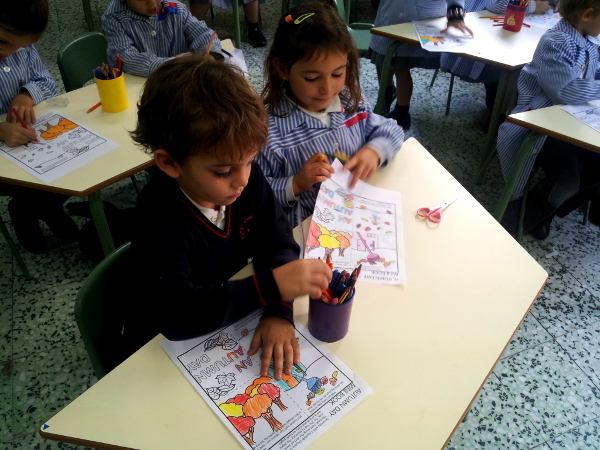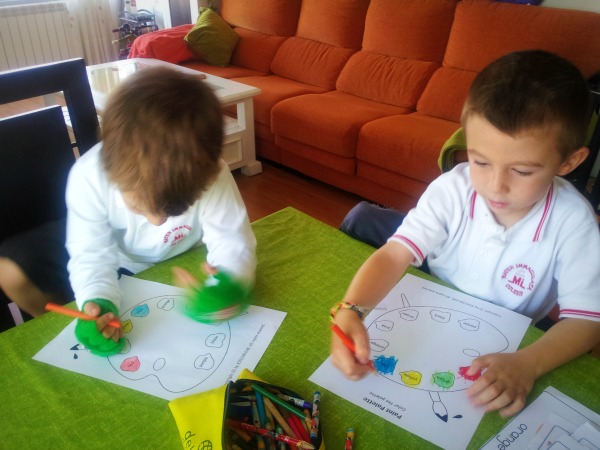If you have the urge to pack your bags, get paid a decent salary and have the time of your life living in Spain, there are plenty of different ways to become an English teacher Spain. That said, researching all of the options out there can feel a bit overwhelming, which is why a few of us bloggers here in Madrid have collaborated to talk about various opportunities to teach English in Spain and share our personal experiences with these programs.
Make sure to check out Curiosity Travels to read about my experience with the Auxiliares de Conversación program, Route Words to learn about Candice and the CIEE program, and The Gilded Nomad to discover more about Kelsey's TEFL experience.
Today I'm thrilled to introduce one of my favorite expat bloggers, Jessica from
Curiosity Travels. After teaching in Korea for a couple of years, Jessica made the move to Madrid and now teaches English through the
BEDA program. I'm always quite envious of her extensive travels and beautiful photos, so be sure to check out her
blog which is sure to inspire you to pack your bags and travel the world!
Jessica, what made you decide to teach in Spain?
After college, I decided to teach in South Korea. The benefits of teaching there are great, and the money and vacation time kept me there for two years. After that, I took my savings and went to travel for about 5 months. Although I overall enjoyed the experience in Korea, and of course all my travels around Asia, I didn't always connect with Korean culture and lifestyle. I still wanted to teach abroad, so I decided to pick a location based on the lifestyle rather than the salary and benefits. I knew some Spanish already, so Spain just seemed to be a perfect fit!
 From cold Korea to sunny Spain!
From cold Korea to sunny Spain!
What is your program, and why did you choose it?
I am in the
BEDA program which places successful applicants in Catholic schools around Spain, but mostly in Madrid. I knew that I wanted to be in Madrid, so this seemed like a good choice. I also don't like programs which can randomly place you anywhere, so I was hesitant to do the ministry program. I had also heard about how unorganized the ministry program is, so that was another deterrent. BEDA also offers a lot of support in terms of visas, setting up banks accounts and school placements so I went with it!
How did you apply, and how difficult was the process?
Overall, it's pretty simple. You must be a native English speaker from an English speaking country, have a clean criminal record and either a college degree or be in the process of getting one.
I applied in November for the upcoming fall term. Sending over the documents was very straight forward and I was soon given a Skype interview time. I had that in January and it was very basic, more like a Q&A session for the program rather than an interview. By April, I had heard that I had been accepted and was sent my school placement. To accept, I had to send over €175 to hold my placement and be enrolled in the university classes which are also part of the program.
How much do you get paid and is it enough to live off of?
In the BEDA program you are able to choose how many hours you teach, and your salary is based off of that. I teach 18 hours (which comes out to about 21 classes) and receive €823 a month after taxes and medical. It is enough to live a basic lifestyle with, but doesn't allow for travel. I teach private classes on the side to supplement the rest of my income.
 Let private classes pay for your churro addiction
Let private classes pay for your churro addiction
How many hours in total are you working?
I am at work (or teaching private classes) for a total of about 28 hours a week. This includes 21 classes at my school and 5 private classes. I don't have to lesson plan at my school, and I probably spend less than an hour or two in total lesson planning for my private classes. Most of my private classes are with small children, so during my breaks I just print off worksheets and crafts. During the classes I also use a lot of online games and flashcards.
With my schedule, I am kept pretty busy three days a week. The other day is a half day and I have every Friday off unless I am scheduled to attend one of the three hour BEDA classes. It's great compared to most jobs in the U.S.A., that's for sure!
With the BEDA program, if you want to have Fridays off, you should probably choose less than 20 hours. Although it is not guaranteed, your school can bunch your classes together to make that possible. If you want more money without having to find private classes, I'd recommend that you choose to work 20+ hours.
What has been your experience teaching private classes on the side?
My private classes were very easy to find. A lot of the parents at my school wanted them, so right after school at 4:45 I either walk the students home or get driven to their houses which are all a short distance away. This is nice because I don't waste time commuting to classes. I also teach one 4-year-old twice a week, during lunch. I walk about 15 minutes to his house, stay with him for an hour and then walk back all in time to make it to my next class.
These classes keep me busy, and sometimes I really don't want to do them, but they pay the bills and allow me to save a little each month!
Some of the students are just so cute!
How did your program prepare you?
The BEDA program was pretty good with answering all questions we had about the job before arrival. The coordinators are very responsive and helpful. They gave good advice and instructions for getting the visa and upon arrival we had an orientation to complete our visa paperwork. A bank account was also set up for us and taken care of.
In terms of meeting other people in the program or informing us about life in Spain, I think the program could have done better. The orientation was very centered around formalities, information about the Catholic school system and paperwork and didn't allow for socializing or preparing for our time in Spain. They offered a little assistance for finding an apartment, but we were mostly on our own.
What are the pros and cons of your program?
The definite pro of this program is the support they offer in terms of visa and banking paperwork. My residency card happened to have a misprint, and although it's now a huge headache, they are helping me though every complicated step. It is also a smaller program, so any question or problem I have I know one of the coordinators will respond quickly. There are no problems in terms of late payments, and if you happen to have a problem with your school they are happy to fix the situation or help you switch.
For me, the cons are both the pay and the extra classes. I wish this program paid as much as the ministry so I didn't have to fit in private classes. I also do some social media work and spend a lot of time on my blog, so working 28 hours a week keeps me very busy. I also personally don't enjoy all the required classes even though they are only once or twice a month. Some of them have not been helpful to me at all. On the other hand, some of the classes are for Spanish, and those are nice to have. This has been helpful for me since I don't pay for any Spanish lessons at the moment and I can use the extra study time.
Did your program live up to its expectations?
Yes, this program did live up to my expectations. I am so thankful for the assistance and organization, but at the same I wish it paid the same as the ministry program. With the BEDA program you are sacrificing a bit more free time and money to be able to be in a program that tries its best to take care of you.
 Teaching English to primary students involves a lot of coloring!
Teaching English to primary students involves a lot of coloring!
Who would you recommend this program to?
I would recommend this program to people who aren't concerned about being able to save money while in Madrid. If you just want to break even, then this program will be fine. I would also recommend this program to people who aren't comfortable having to navigate all the paperwork on their own. Also, if you are new to teaching this would be a good program for you. The first few university classes were about teaching methods and activities to use in the classroom. Also, if you are comfortable in smaller, more reliable programs, this might be best for you.
What level of Spanish do you need to have to participate in this program?
It is not a requirement to speak much Spanish at all to participate in this program, although it helps in general. Some of the orientation was held in Spanish and some of the Spanish teachers in the Catholic schools don't have the strongest level of English. There are many people who have a very basic level of Spanish and still do just fine. Overall, I would recommend learning as much as you can before arrival just for your own personal benefit.
What's your favorite part about living in Spain?
My favorite part of living in Spain is getting to know Spanish culture and lifestyle. It is such an enjoyable and fun country to live in! I also really enjoy being in such a convenient spot for travel. There are so many places to explore not only in Spain, but Europe itself!

When Jessica isn't teaching or taking advantage of cheap RyanAir flights, you will probably find her in the Asian supermarkets scouring the aisles for the best ingredients for pad thai or Korean kimbap. She also tweets and Instagrams for Madrid Food Tour where she shares food porn with the rest of the world. You can follow her journey from Asia to Europe, and everywhere in between, all on her blog
CuriosityTravels.org.
What are your thoughts on teaching abroad?
Do you have any experiences you'd like to share?





























 When Jessica isn't teaching or taking advantage of cheap RyanAir flights, you will probably find her in the Asian supermarkets scouring the aisles for the best ingredients for pad thai or Korean kimbap. She also tweets and Instagrams for Madrid Food Tour where she shares food porn with the rest of the world. You can follow her journey from Asia to Europe, and everywhere in between, all on her blog
When Jessica isn't teaching or taking advantage of cheap RyanAir flights, you will probably find her in the Asian supermarkets scouring the aisles for the best ingredients for pad thai or Korean kimbap. She also tweets and Instagrams for Madrid Food Tour where she shares food porn with the rest of the world. You can follow her journey from Asia to Europe, and everywhere in between, all on her blog 


